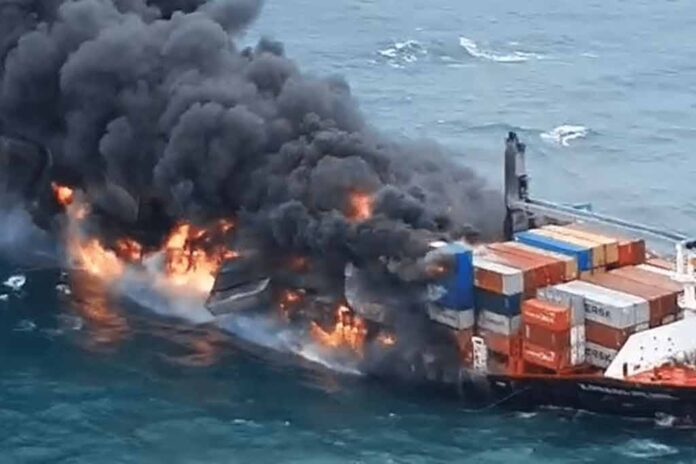Sri Lanka’s worst marine disaster, the X-Press Pearl catastrophe of 2021, has once again resurfaced in the public eye this time not for the environmental havoc it caused, but for the brazen refusal of its operators to pay the US$1 billion in damages ordered by the Supreme Court. The case exposes not only the fragility of international maritime law but also the disturbing possibility of political profiteering in Colombo’s corridors of power.
A Billion-Dollar Blaze at Sea
The Singapore-flagged container vessel MV X-Press Pearl caught fire off Colombo on May 20, 2021. Its cargo included 81 containers of hazardous chemicals notably nitric acid and lead ingotsalong with hundreds of tonnes of plastic pellets. Denied entry by ports in Qatar and India after reporting the acid leak, the vessel entered Sri Lankan waters, where it burned for nearly two weeks before sinking.
The aftermath was catastrophic. An 80-kilometre stretch of Sri Lanka’s western coast was inundated with microplastics, while fishing was banned for months, crippling livelihoods. A government-appointed expert panel later estimated the economic and environmental damage at US$6.4 billion, though some marine scientists argue the final bill could exceed US$15 billion once long-term losses to biodiversity, tourism, and fishing stocks are accounted for.
The Court Order and the Refusal
In July 2025, the Supreme Court ordered X-Press Feeders—the vessel’s operator—to pay US$1 billion in damages in three tranches, beginning with US$250 million by September 23. Yet, on the eve of the deadline, company CEO Shmuel Yoskovitz flatly rejected the order.
He argued that unlimited liabilities “undermine the entire base of maritime trade” and warned of a “dangerous precedent” that could raise global insurance premiums. The firm insists it has already spent US$170 million on wreck removal, beach clean-up, and compensation for fishermen, but maintains that any settlement must fall under international maritime conventions that cap liability.
Critics, however, point out that Sri Lankan courts found the company and its agents guilty of withholding crucial information, ignoring early warnings, and failing to prevent the disaster. For many, the company’s rejection is not a matter of principle but a calculated escape through legal loopholes.
Who Really Pays the Price?
While the shipping company invokes maritime law to limit exposure, Sri Lankan fishing families, tourism operators, and marine ecosystems bear the brunt. Scientists warn that the spill’s invisible scars microplastic contamination and coral reef damage will haunt the country for decades. The US$1 billion judgment itself is modest compared to the scale of losses, and refusing even that amount raises the spectre of injustice on a global stage.
Allegations of Political Profiteering
The scandal has also taken a darker turn. In 2023, then-Justice Minister Wijeyadasa Rajapakshe revealed evidence of a staggering US$250 million bribe allegedly paid to a Sri Lankan intermediary to derail litigation.
The revelations suggested possible involvement of figures tied to the Rajapaksa regime, though no convictions have followed. Reports also allege that insurers sought to influence officials to disrupt legal action, raising questions of whether sections of the political elite stood to benefit from the disaster.
If proven, such allegations mean Sri Lanka’s tragedy was not just ecological and economic—it became a political cash cow for those entrusted with protecting national interests.
Can X-Press Pearl Walk Away?
Legally, X-Press Feeders has secured an order from London’s Admiralty Court capping its liability at just £19 million, a fraction of the Sri Lankan court’s award. Enforcement of Sri Lanka’s judgment abroad will be difficult, with related litigation in Singapore and the UK dragging on until at least 2026.
But morally, the refusal to pay is indefensible. With damages running into billions, lives and livelihoods destroyed, and Sri Lanka’s reputation scarred, many argue that allowing the company to walk away would signal open season for polluters.
The Final Reckoning
The X-Press Pearl case is no longer just about one ship it is about whether global shipping giants can hide behind conventions to escape responsibility, and whether corrupt local actors will continue to trade national interest for personal gain. For Sri Lanka, the fight is not only for compensation but also for justice, transparency, and the principle that the polluter must pay.
Until then, the Indian Ocean remains a graveyard of accountability its waters poisoned, its people betrayed.
